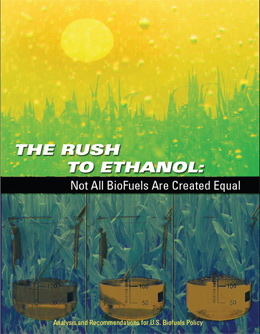Corn ethanol is not solution to energy independence
Corn ethanol is not solution to energy independence
mongabay.com
July 18, 2007
A new report claims that corn ethanol will not significantly offset U.S. fossil fuel consumption without “unacceptable” environmental and economic consequences.
The report, The Rush to Ethanol: Not all BioFuels are Equal, reviews recent scientific studies on the environmental and economic implications of replacing fossil fuel production with corn ethanol. It found that corn ethanol is neither realistic nor productive source of biofuel.
“Dedicating the entire U.S. corn crop to ethanol production would only offset 15 percent of gasoline demand,” explained a statement release by the Network for New Energy Choices, one of the groups that sponsored the report. “Conversely, modest increases in auto fuel efficiency standards of even one mile per gallon for all cars and light trucks, such as those passed by the Senate last month could cut petroleum consumption by more than all alternative fuels and replacement fuels combined.”
Further, says the report, at best corn ethanol will only reduce greenhouse gas emissions by 18 percent to 28 percent relative to gasoline. In comparison, cellulosic ethanol is expected to offer a reduction of 87 percent. Corn ethanol also presents health and pollution concerns.

The Rush to Ethanol: Not all BioFuels are Equal |
“Expansion of the corn ethanol industry will lead to more water and air pollution and soil erosion of America’s farm belt, while failing to significantly offset fossil fuel use or combat global warming,” said Scott Cullen, Senior Policy Advisor for the Network for New Energy Choices.
“Rural communities won’t benefit from the Farm Bill becoming a fuel bill. In the long run, family farmers and the environment will be losers, while agribusiness, whose political contributions are fueling the ethanol frenzy, will become the winners,” said Wenonah Hauter, Executive Director of Food & Water Watch, a group that also underwrote the research.
The report recommends specific revisions to the 2007 Farm Bill, including tying biofuels promotion policies to the sustainability of the feedstock, eliminating subsidies for coal-fired ethanol refineries, and offering lLoan guarantees for refineries owned directly by farmers and rural communities — not agribusiness giants.
The Vermont Law School Institute for Energy and the Environment also backed the report.
The Rush to Ethanol: Not all BioFuels are Equal
Related articles














